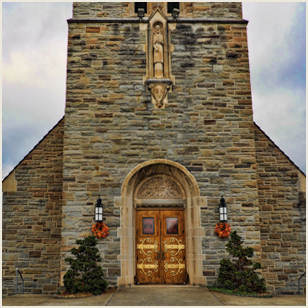Blessed Virgin Mary, Page: Quotes, Prayer (how), Quote Topic, Spiritual (life)
Have you not often met poor old women who are most faithful to the pious recitation of the Rosary? You also must do all that you can to recite it with fervor. Get right down, at the feet of Jesus: it is a good thing to make oneself small in the presence of so great a God.
–Blessed Columba Marmion (1858-1923)
Blessed Virgin Mary, Page: Quotes, Quote Topic
By Mary, God descended from Heaven into the world, so that by her men might ascend from earth into Heaven.
–Saint Fulgentius of Ruspe (Fifth — Sixth Century)
Page: Quotes, Prayer (how), Prayer (problems), Quote Topic
It is better to say one Our Father fervently and devoutly than a thousand with no devotion and full of distraction.
–Saint Edmund (c. 841-868)
Page: Quotes, Prayer (how), Quote Topic
Sit down alone and in silence. Lower your head, shut your eyes, breathe out gently and imagine yourself looking into your own heart. Carry your mind, i.e. your thoughts, from your head to your heart. As you breathe out, say, “Lord Jesus Christ, have mercy on me.” …. Try to put all other thoughts aside. Be calm, be patient, and repeat the process very frequently.
–Saint Symeon the New Theologian (949-1022)
Evangelization, Love (others), Page: Quotes, Quote Topic
God’s Soul is the wind rustling plants and leaves, the dew dancing on the grass, the rainy breezes making everything to grow. Just like this, the kindness of a person flows, touching those dragging burdens of longing. We should be a breeze helping the homeless, dew comforting those who are depressed, the cool, misty air refreshing the exhausted, and with God’s teaching we have got to feed the hungry: This is how we share God’s soul.
–Saint Hildegarde of Bingen (1098-1179)
Grace, Johannes Tauler (c. 1300-1361), Page: Quotes, Quote Author, Spiritual (life)
The gracious, eternal God permits the spirit to green and bloom and to bring forth the most marvelous fruit, surpassing anything a tongue can express and a heart conceive.
–Johannes Tauler (c. 1300-1361)

